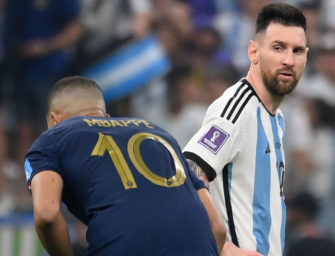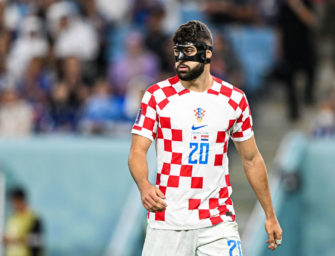European soccer is crumbling behind UEFA's Champions League facade
At the southeast end of Slavia Sofia’s ground, mature trees have burst through the foundations, dislodged seats, and stretched high above the empty stand. Nearby picnic benches are reduced to splinters and shards of metal. Behind the goal where Cherno More scored a spectacular 91st-minute winner in November were piles of sand, two parked hatchbacks, and a digger. Dirt and puddles buried what was presumably a running track lapping the pitch.
The club shop was a portable building near the entrance. It was closed.
Slavia Sofia and Cherno More had title and relegation implications riding on their meeting in the capital. The Bulgarian First League table splits in half following 26 matchdays, intriguingly setting up separate playoffs for the championship and survival. With their respective midtable positions 16 matches into the season, too many missteps over the last 10 games would have dramatically shifted the fortunes of both Slavia and their eastern visitors.
But the match’s context wasn’t enough to mask its sorry setting. The occasion seemed far from professional and revealed the biggest issue with Bulgarian soccer. Below the country’s established elite of Ludogorets, CSKA Sofia, and Levski Sofia, teams are deteriorating.
Razgrad-based Ludogorets, in particular, are outgrowing their domestic rivals and on course for a ninth straight league title, but, in the wider continental game, they too are trampled by the fattening glitterati of Europe’s top five leagues. Bulgaria, like many other countries under UEFA’s umbrella, is being left behind.
Clubs in Bulgaria’s 14-strong top tier generated €42 million in 2018, which was 129 times less than the Premier League’s €5.4-billion windfall, according to a UEFA report published in mid-January. Real Madrid were the most profitable European club that year, earning €751 million in revenue, and they paid €3 million more than Bulgaria’s total revenue alone to secure Vinicius Junior’s arrival that summer. The Brazilian was only 16 years old when the deal was brokered a year earlier.

“There’s a team called Dunav Ruse. They are struggling for money; we weren’t so sure if they were going to make it through the second part of the season,” Bulgarian international goalkeeper Dimitar Evtimov told theScore about the pinnacle of club football in his homeland. “That’s the sad thing: There’s a big gap between the top three teams and the rest of the teams, and that’s money.”
Evtimov grew up playing on red gravel in northeastern Bulgaria before he was picked up by an academy close to Sofia, owned by the country’s greatest-ever footballer, Hristo Stoichkov. His accent hints at where he’s spent the bulk of his professional career, though. He moved to two-time European Cup winners Nottingham Forest in 2011 and, after a string of loan moves and a brief spell with Burton Albion, he’s been donning the gloves for Accrington Stanley since January 2018.
The greenery of Lancashire is in stark contrast to the bleak housing projects that tower over Sofia, but Evtimov is proud of his roots and remains a keen supporter of Bulgaria’s top division. He often finds himself comparing the sport in Bulgaria and England.
“In the Premier League, players from the bottom three teams should get more than £40,000 to £50,000 a week, whereas in Bulgaria you’d probably say that, at the bottom three teams, the highest earner will probably earn like €1,000 to €2,000 a month,” Evtimov said. “Or even worse than that, to be honest with you.”
Judging from the sights at Stadion Slavia, it’s surprising that salaries are even that high. Admission was under $3 – or free when the men checking stubs and wearily patting down match-goers disappeared a few minutes after kickoff. Soccerway generously logged the attendance at 230.

The chasm between Europe’s aristocracy and everybody else is widening, and it’s unmistakable in the 2019-20 Champions League campaign, where the knockout rounds comprise only of teams from England, Germany, Spain, Italy, and France. For all their domestic dominance, Ludogorets have reached the group stage once in their history.
Right now, Bulgaria and other neglected corners of European football couldn’t feel more detached from the Champions League’s extravagance and glamor.
Losing the underdog dream
Kennet Andersson is caught in a never-ending cycle at IFK Goteborg.
“We are now in the situation that we really need to see if some teams are interested in our players,” the sporting director admitted to theScore in January. “We cannot, obviously, know straight away, (but) we should look for it and maybe we have to sell because of the economy.”
Andersson devotes a lot of his time to peddling his players. He then reinvests the money into the academy and facilities, and the first team briefly reaps the benefits until, of course, the cycle repeats itself. Pontus Dahlberg, Benjamin Nygren, and Carl Starfelt have all left the club over the past three seasons, only to encounter scant first-team opportunities at Watford, Genk, and Rubin Kazan, respectively. But that doesn’t matter a great deal to Goteborg. The transfer income of around €8.6 million was vital.
Goteborg’s ambitions are limited, but there isn’t much choice. Andersson appreciates that, despite two UEFA Cups in the 1980s and 18 Swedish titles, they are “very low” in European football’s hierarchy. In 2018, Sweden’s Allsvenskan – the country’s top division – ranked 17th in UEFA for the average revenue of its clubs, one place below Kazakhstan’s Premier League.
Currently, the 2020 Allsvenskan winners will earn a spot in the first qualifying round of the Champions League, which kicks off in July 2021. It’s a pitiful reward: entrance at that phase puts eight matches between a club and the lucrative group stage, and few minnows can vault that many hurdles with their shallow resources. The top five leagues in Europe, meanwhile, are gifted four group-stage berths apiece. Tottenham Hotspur have been ushered down that pathway for each of the past four seasons and scooped up all of the money that privilege entails, despite not winning a league title since 1961.

No wonder the rest of Europe feels locked out.
“We want the underdogs to be able to take these steps, absolutely,” Andersson said, reflecting on Ajax Amsterdam’s run to the 2018-19 Champions League semifinals. “I think you cheer for them even if your favorite team is Barcelona or Real Madrid. Somehow that romantic part is always there. That’s the fire of football, I think.”
It could get even worse. In May 2019, news came to light that UEFA president Aleksander Ceferin was plotting an expanded group stage for the 2024-25 Champions League campaign. The proposed revamp would guarantee group-stage places to 24 teams in subsequent editions, based purely on their continental performance. Where they finish in their country’s league system would no longer matter. The other eight Champions League berths would be comprised of the four Europa League semifinalists and four domestic league winners who successfully negotiated qualification games.
Basically, these plans promote a closed-off system that protects the established elite. It’s no surprise that the scheme was formed with pressure from the prestigious European Club Association, a group headed by Juventus owner Andrea Agnelli. Domestic football would be devalued and, with the same clubs competing in the Champions League season after season, the financial divide between the richest and the rest would broaden. It wouldn’t have allowed for Ajax’s miraculous 2018-19 Champions League run because, in the revised format, their second-place finish in the 2017-18 Eredivisie season would’ve only merited a place in the Europa League qualification rounds.
“They want to have the door open, they want to have some chance for the dream to come through for the smaller clubs,” Andersson, who sits sixth in the all-time scoring charts for Sweden, said of fans’ appetite for underdog tales. “Not only small clubs like us, but smaller clubs in the bigger leagues.”

UEFA is constantly devising ways to bleed more money out of its flagship competition, but it doesn’t necessarily increase the entertainment value; in fact, it can have an adverse effect. The biggest, richest clubs competing in the Champions League round of 16 will raise revenue, but, when the same teams from the same five countries are pitted against one another every year, there is a dearth of underdogs, cultural diversity, and variety in the matchups. Some of the tournament’s most appealing qualities would be stamped out.
“In any kind of job I think sometimes you get too close to your own job,” Andersson explained of UEFA’s governance. “I think maybe sometimes you have to see a new perspective, you have to go and visit other countries, other clubs, to see what things are in football.”
But Andersson’s overall outlook is positive, both for Goteborg and the influence supporters can have in the modern game.
“In the end, the people will win. There’s no other way.”
The BeNeLiga
Wherever Mattijs Manders travels in the world, taxi drivers want to talk to him about Johan Cruyff, Ruud Gullit, and the latest Dutch generation headed by Virgil van Dijk and Frenkie de Jong. Football is the nation’s greatest export, but UEFA’s preoccupation with Europe’s top five leagues is diminishing the status of the Netherlands’ first division.
Manders knows this more than most as chief executive of the Eredivisie. UEFA’s study on 2018’s finances revealed 30 of Europe’s giants earned almost as much revenue as the other 682 top-flight clubs combined, and every club in the Netherlands’ elite rung – even four-time European Cup winners Ajax – was part of the 682. If UEFA continues to limit opportunities for clubs outside of England, Germany, Spain, Italy, and France, Dutch sides will never have the financial clout to consistently compete with Europe’s heavy hitters.
Rather than sit back and let this happen, Manders wants to emerge from his corner swinging.

“We try to do everything to grow on the international table to become the sixth league of Europe,” Manders told theScore. “We try to focus on that goal. Because we also understand that if we don’t do anything, the gap will only be bigger and bigger.”
Manders is trying to boost the Eredivisie’s presence with academies and offices in other parts of the world. He’s also trying to reach the challenging demographic of children aged 8 to 15 via well-executed digital channels.
However, those initiatives pale in comparison to the other project that Manders is exploring. The former executive of ADO Den Haag, a modest club with two Dutch titles dating back to the 1940s, may instigate a change that would radically change the landscape of European soccer.
“We are doing a study with Deloitte to find out whether it makes sense in the future to create one league with Belgium – the BeNeLiga,” he explained.
“We are not just accepting the situation as it is. We will try to do anything to find out what we can do as quite a small league to close the gap with the bigger leagues around us in Europe.
“I hear sometimes also in other countries’ leagues, they’re trying to find out whether a cross-border league would be interesting. I think it would increase the level of the competition.”
When disgraced former UEFA president Michel Platini touted the idea of merging the leagues in 2009, it was widely panned by clubs, fans, the football associations, and the media. Many thought Belgian clubs would be overpowered by the supposedly superior Dutch sides. Each country also anticipated bright futures for its league because of the players it was developing, but, at the very crux of the argument, was nationalism.
Manders appreciates that combining rival cultures remains a sensitive subject in 2020, but the latest exploration of the concept was initiated by six Dutch clubs (Ajax, AZ Alkmaar, FC Utrecht, Feyenoord, PSV Eindhoven, and Vitesse Arnhem) and five Belgian clubs (Anderlecht, Club Brugge, Genk, Gent, and Standard Liege).

It seems the countries’ ambitious outfits are becoming increasingly claustrophobic under the weight of clubs like Barcelona, Manchester United, and Bayern Munich. Manders, like most grinding away below the top five leagues, wants a fairer distribution of wealth where more trickles down to the smaller clubs, but why wait for a UEFA reform that might never happen? Melding the Eredivisie (ranked eighth for the average revenue of its clubs in 2018) and Belgium’s Pro League (ninth) would cram more continental-grade teams into one division and challenge the top five for revenue streams, and that would be impossible for UEFA to ignore. The BeNeLiga alliance could force the administrative body to grant more automatic European places to Dutch and Belgian sides.
In the current climate, Manders even finds it difficult to entice his two young children to attend continental matches with him. Part of the reason is that they think they already know what the outcome will be. Barring a huge upset, the richest team will always win. UEFA isn’t forthcoming with strategies to let the rest of Europe catch up, so it’s up for leagues below the domineering quintet and supporters of UEFA-governed football to stop the systematic dilution of Europe’s competitiveness and color.
Otherwise, fans won’t just stay at home; they’ll switch off the television as well.
“Football should be unpredictable,” Manders stated. “The attractiveness of the game should be that every club, however small they are, should be able to win sometimes against Barcelona.
“But it’s all predictable if we already know beforehand that Barcelona will win the cup, and I think all fans will go away and find another sport to support.”






Latest Comments